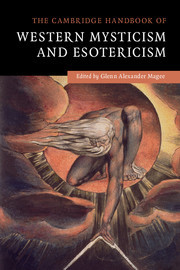Description
The Cambridge Handbook of Western Mysticism and Esotericism
Coordinator: Magee Glenn Alexander
This Handbook is unique in treating Western mysticism and esotericism together - two distinct, yet intimately related fields.
Language: English
Subject for The Cambridge Handbook of Western Mysticism and Esotericism:
The Cambridge Handbook of Western Mysticism and Esotericism
Publication date: 08-2019
Support: Print on demand
Publication date: 08-2019
Support: Print on demand
The Cambridge Handbook of Western Mysticism and Esotericism
Publication date: 04-2016
Support: Print on demand
Publication date: 04-2016
Support: Print on demand
Description
/li>Contents
/li>Biography
/li>
Mysticism and esotericism are two intimately related strands of the Western tradition. Despite their close connections, however, scholars tend to treat them separately. Whereas the study of Western mysticism enjoys a long and established history, Western esotericism is a young field. The Cambridge Handbook of Western Mysticism and Esotericism examines both of these traditions together. The volume demonstrates that the roots of esotericism almost always lead back to mystical traditions, while the work of mystics was bound up with esoteric or occult preoccupations. It also shows why mysticism and esotericism must be examined together if either is to be understood fully. Including contributions by leading scholars, this volume features essays on such topics as alchemy, astrology, magic, Neoplatonism, Kabbalism, Renaissance Hermetism, Freemasonry, Rosicrucianism, numerology, Christian theosophy, spiritualism, and much more. This Handbook serves as both a capstone of contemporary scholarship and a cornerstone of future research.
Part I. Antiquity: 1. Ancient mysteries Charles Stein; 2. Pythagoras and Pythagoreanism Joscelyn Godwin; 3. Parmenides and Empedocles Jessica Elbert Decker and Matthew Mayock; 4. Plato, Plotinus, and Neoplatonism Gwenaëlle Aubry; 5. Hermetism and Gnosticism Roelof van den Broek; 6. Early Jewish mysticism Daphna Arbel; 7. Early Christian mysticism April D. Deconick; Part II. The Middle Ages: 8. Sufism William C. Chittick; 9. Kabbalah Brian Ogren; 10. Medieval Christian mysticism Bruce Milem; 11. Hildegard of Bingen and women's mysticism Anne L. Clark; Part III. The Renaissance and Early Modernity: 12. Renaissance Hermetism Antoine Faivre; 13. Christian Kabbalah Peter J. Forshaw; 14. Paracelsianism Bruce T. Moran; 15. Rosicrucianism Hereward Tilton; 16. Jacob Boehme and Christian theosophy Glenn Alexander Magee; 17. Freemasonry Jan A. M. Snoek; 18. Swedenborg and Swedenborgianism Jane Williams-Hogan; 19. Mesmer and animal magnetism Adam Crabtree; Part IV. The Nineteenth Century and Beyond: 20. Spiritualism Cathy Gutierrez; 21. H. P. Blavatsky and theosophy Michael Gomes; 22. Rudolf Steiner and anthroposophy Robert McDermott; 23. The Golden Dawn and the O.T.O. Egil Asprem; 24. G. I. Gurdjieff and the Fourth Way Glenn Alexander Magee; 25. C. G. Jung and Jungianism Gerhard Wehr; 26. René Guénon and traditionalism Mark Sedgwick; 27. Via Negativa in the twentieth century Arthur Versluis; 28. Contemporary Paganism Chas S. Clifton; 29. The new age Olav Hammer; Part V. Common Threads: 30. Alchemy Lawrence M. Principe; 31. Astrology Kocku von Stuckrad; 32. Gnosis Wouter J. Hanegraaff; 33. Magic Wouter J. Hanegraaff; 34. Mathematical esotericism Jean-Pierre Brach; 35. Panpsychism Lee Irwin; 36. Sexuality Hugh B. Urban.
Glenn Alexander Magee is Professor and Chairman of the Department of Philosophy at the C. W. Post Campus of Long Island University, New York. He is the author of Hegel and the Hermetic Tradition (2001) and The Hegel Dictionary (2011), as well as many articles on German philosophy and its connections with mysticism and esotericism.
© 2024 LAVOISIER S.A.S.

